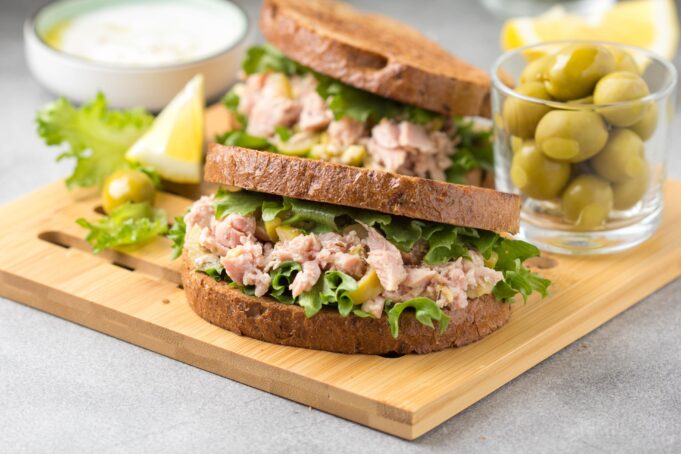For many of us, our tresses are used to express individuality, creativity, and personality – which is why losing it can be stressful and sometimes downright frightening.
Naturally, we lose between 50 and 100 hairs each day. But sometimes, hair loss can become a real problem that affects over eight million women in the UK alone, leaving a real dent in self-confidence. Whilst hair loss can be linked to a medical condition, according to the experts, there are 5 hidden reasons that may be lurking behind your hair loss.
You are what you eat
If you entered 2025 vowing to watch what you eat, you are not alone. But did you know that hair loss could be caused by a nutritional deficiency – and even tuna?
A skin expert from RegenLab explains that you should never underestimate the effect diet can have on your hair and overall health.
She says: “Your diet can really impact the overall health, and the condition of your hair. A lack of iron, protein and zinc can lead to hair thinning and even impact how long it grows.
Iron is necessary to produce haemoglobin within the body, but it is also one of the leading nutritional deficiencies in the world and could lead to medical conditions such as anaemia, and even cause the hair to thin.
Try to incorporate foods such as meat, fish, and eggs into your diet to support your iron intake. In terms of fruits, apples, banana and pomegranates are high in iron content.”
A lack of protein and zinc within the diet can also trigger hair loss, again one of the best sources of both nutrients is meat, however if you are vegetarian or vegan, you could try foods such as beans, lentils, nuts and quinoa.
Crash dieting is also a big factor in hair loss, as restricting your calorie intake means that you are less likely to ingest enough of those essential nutrients. If you are wanting to lose weight, do it in a healthy way through diet and exercise. If you are struggling with weight loss, speak to a professional, who will advise you on realistic and achievable dietary and lifestyle changes.”
Menopause and hormonal imbalances
Whilst hormonal imbalances are often linked to menopause, they are actually very common and affect both men and women during various stages of life.
Experts say: “Hormonal imbalances are very common in both men and women and can cause weight gain, anxiety, depression, cognitive issues, fatigue, and hair loss.
Naturally, women go through the most notable hormonal that can contribute to hair loss, including pregnancy and menopause. But hormonal imbalances are actually very common and can affect both men and women of all ages.
Both oestrogen and testosterone have a direct impact on hair. While oestrogen is crucial to maintaining the overall health of your hair, testosterone – which is also present in females can cause hair to thin significantly because of DHT. A derivative of testosterone, DHT levels may cause hair follicles to shrink.
During the menopause, oestrogen levels naturally decline which may lead to the hair becoming drier, brittle and eventually begin to thin. Unfortunately, this makes DHT levels more prevalent, leading to significant hair loss.
If you are experiencing symptoms of a hormonal imbalance, you should speak to a doctor. There are plenty of treatments available on the market, including bioidentical hormone therapy that identifies your exact deficiency, and replenishes those individual hormones to restore optimum performance within the body.”
Vitamins and minerals
Don’t get us wrong, we’re most certainly not telling you to avoid tuna. Tuna is a fantastic food that is rich in omega-3 fatty acids, vitamin D, B2 minerals and more. It has even been found to reduce the risk of stroke, and heart disease.
However, studies from the North American Menopause Society journal have shown that too much tuna could result in hair loss during early menopause.
An expert says: “It is believed that tuna fish has a higher level of mercury content than other fish, which may contribute to hair loss during the early stages of menopause. This mercury content could interfere with hormones, including insulin, oestrogen, and testosterone, and disrupt protein development within the body, which unfortunately can cause a number of ailments, including hair loss, anxiety, mood swing, and cognitive issues.”
Adding: “Mercury is a chemical compound found which unfortunately can be found in many foods. Whilst trace exposure is harmless, overexposure could pose problems to our overall health and lead to hair loss.
In terms of fish, tuna, swordfish and mackerel are believed to have the highest mercury content and should therefore be eaten in moderation to avoid any potential risk of mercury exposure. To maintain a healthy, balanced diet, I recommend eating fish around twice per week but try to eat a variety, including oily fish.”
Mental health and stress
Mental health should never go ignored. The physiological symptoms of depression such as low mood, discouragement, low self-esteem, and fatigue can be a contributing factor in hair loss.
A leading Consultant Plastic Surgeon comments: “Mental health issues are unfortunately on the rise and current statistics show that 1 in 4 people in the UK have been diagnosed with a mental health ailment.
Unfortunately, studies also show that one contributing factor to mental health diagnosis is the unrealistic expectations and beauty standards being portrayed across social media. For many people, hair is intrinsically linked to self-confidence, which again circles back to mental health. When stress causes the hair to thin, it can be very difficult.”
A skin expert says: “I recommend first identifying the underlying cause and stress factors that may be contributing to hair loss and seeking help from a professional who will be able to advise you of any treatments that may help including medication, lifestyle changes and minimally-invasive treatments including PRP which will help to stimulate hair growth.”
Adding: “If you are concerned about hair loss, there are surgical procedures that can help, including hair transplants and restoration surgeries such as Follicular Strip Extraction (FSE) where the surgeon will remove a strip of hair from the back of the head, cut out individual hair follicles and transplant to the area of concern. A newer version of this treatment uses robots to transplant individual hairs which is less time consuming, this is known as Follicular Unit Extraction. There are also laser treatments available to stimulate growth from the hair follicle but their benefits are debated.”
Continuing: “There are also minimally-invasive treatments and solutions that can help to treat hair thinning and loss, including Platelet Rich Plasma (PRP) therapy Injections which use your own plasma to help regenerate and stimulate hair regrowth in both men and women. PRP has been around for years, and it has been proven to help with hair loss.”
Polycystic Ovary Syndrome
Polycystic Ovary Syndrome (PCOS) is a common hormone disorder that affects over 10% of women, making it one of the most common endocrine disorders worldwide. Whilst many women grow thicker hair around the face and body, some experience hair thinning and loss, known as female pattern hair loss.
Experts say: “The reason PCOS can cause hair loss is down to hormones. The female body produces male hormones, known as androgens which include testosterone. These androgens play a vital role in triggering puberty and stimulating hair growth on the body.
PCOS may cause extra androgen production, which can cause your hair to start thinning, especially near the front of your scalp.”
Adding: “While any hair you lose due to PCOS is likely to be progressive, you may be able to use both non-surgical and minimally-invasive procedures to promote hair recovery due to PCOS-related hair loss.”
It is estimated that we Brits spend over £160 per month on maintaining our tresses. For many of us, our hair links to our self-confidence, and whilst medical ailments can impact it, it is important to remember that taking care of your health from the inside out and working with professionals will help you maintain those locks.
Do you have a story to tell? Email holly@harleystreetcommunications.co.uk













